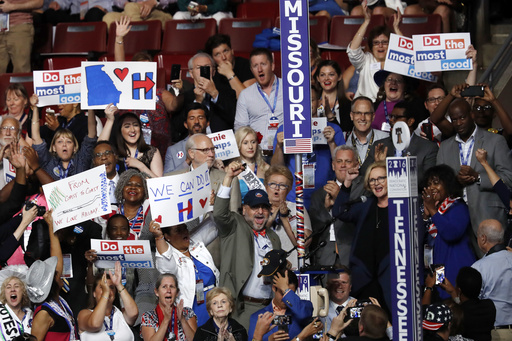WASHINGTON (AP) — President Joe Biden’s withdrawal from his reelection bid and his endorsement of Vice President Kamala Harris to take on Republican Donald Trump in November scrambled what had once been a settled and suspense-free contest for the Democratic presidential nomination.
To help understand what will come next, The Associated Press is surveying the nearly 4,000 pledged delegates to the Democratic National Convention to determine which candidate they plan to support to be the party’s presidential nominee or if they remain undecided. Results will be updated regularly.
The latest results show Harris with more than enough support among delegates to win the nomination on the first round. As of Monday evening, the AP confirmed that more than 2,500 delegates planned to support the vice president. The number of delegates needed to win the nomination is 1,976. Although it’s not binding, the show of support makes Harris the overwhelming frontrunner.
Unlike the AP’s count of delegates won during the party’s primaries and nominating contests, the survey is an unofficial tally and is only an indication of whom the party will pick to replace Biden at the top of the Democratic ticket against Trump, the former president.
Under Democratic Party rules, delegates are free to support any candidate they choose or change their minds until Democrats conduct an official vote to pick a nominee later this summer. The convention is scheduled for Aug. 19-22 in Chicago, though the party may make its nomination through a virtual roll call before the convention.
The AP is conducting the survey by contacting delegates individually by phone, email, social media accounts or personal interviews. If a delegate makes a public statement indicating support for a candidate, that information is also included in the overall tally. Confirmation from state parties that their entire delegation plans to support a candidate or that a specific number of their delegates support a candidate are also counted.
Candidates typically win delegates based on their performance in various primaries and caucuses, and those delegates are pledged to support that candidate at the convention. While party rules state that delegates are pledged to support a particular candidate only as a matter of “good conscience,” past election cycles since the current system was adopted in the 1980s show that delegates rarely, if ever, break their pledge.
Biden had secured enough delegates by March 12 with primary and caucus victories to unofficially clinch the nomination and become the presumptive nominee, and since then he had amassed support from 3,896 out of 3,949 delegates eligible to vote in the first round at the convention.
His exit from the race on Sunday means those delegates who decide the nominee must now find a new candidate to support, and Biden cannot give those delegates to Harris or any other candidate. The Biden delegates are free agents who are free to support any other candidate or change their minds at any time without party rules creating an expectation that they stick with a particular candidate.
For that reason, no candidate can become the “presumptive nominee.” That term is reserved for a candidate who wins a majority of pledged delegates through the party’s official delegate selection process.
In order to be eligible to receive votes for the nomination, a candidate must submit a petition signed by at least 300 delegates, with no more than 50 delegates from any one state and each delegate limited to signing one petition. No delegates in the AP’s survey indicated support for any candidate other than Harris.
In previous presidential campaign cycles, the AP has conducted surveys of the more than 700 individuals, known informally as superdelegates, who automatically serve as convention delegates by virtue of a position they hold within the party. Superdelegates include sitting Democratic governors, U.S. senators and U.S. representatives, as well as members of the Democratic National Committee, former presidents and past DNC chairs.
Superdelegates used to cast votes to pick a nominee along with pledged delegates during the first round of voting at the convention, but rules changes following the 2016 presidential election bar superdelegates from voting until the second round. If it appears that no candidate heads into the convention with a clear majority of delegates, the AP will survey current superdelegates as well.
___
Follow the AP’s coverage of the 2024 election at https://apnews.com/hub/election-2024.
Home Politics Live Politics Who will win delegates’ support to be the Democratic nominee? AP’s survey...
